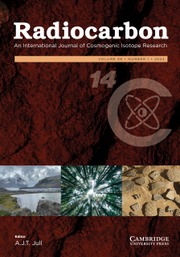Crossref Citations
This article has been cited by the following publications. This list is generated based on data provided by
Crossref.
Martin, Paul S.
1987.
Late Quaternary extinctions: The promise of TAMS 14C dating.
Nuclear Instruments and Methods in Physics Research Section B: Beam Interactions with Materials and Atoms,
Vol. 29,
Issue. 1-2,
p.
179.
Gillespie, Richard
1987.
Why date old bones?.
Nuclear Instruments and Methods in Physics Research Section B: Beam Interactions with Materials and Atoms,
Vol. 29,
Issue. 1-2,
p.
164.
Hester, James J.
1987.
The Significance of Accelerator Dating in Archaeological Method and Theory.
Journal of Field Archaeology,
Vol. 14,
Issue. 4,
p.
445.
Taylor, R.E.
1987.
AMS 14C dating of critical bone samples: Proposed protocol and criteria for evaluation.
Nuclear Instruments and Methods in Physics Research Section B: Beam Interactions with Materials and Atoms,
Vol. 29,
Issue. 1-2,
p.
159.
DeNiro, Michael J
and
Weiner, Stephen
1988.
Chemical, enzymatic and spectroscopic characterization of “collagen” and other organic fractions from prehistoric bones.
Geochimica et Cosmochimica Acta,
Vol. 52,
Issue. 9,
p.
2197.
DeNiro, Michael J.
and
Weiner, Stephen
1988.
Use of collagenase to purify collagen from prehistoric bones for stable isotopic analysis.
Geochimica et Cosmochimica Acta,
Vol. 52,
Issue. 10,
p.
2425.
Kra, Renee
1988.
Updating the past: The Establishment of the International Radiocarbon Data Base.
American Antiquity,
Vol. 53,
Issue. 1,
p.
118.
Deniro, Michael J.
and
Weiner, Stephen
1988.
Organic matter within crystalline aggregates of hydroxyapatite: A new substrate for stable isotopic and possibly other biogeochemical analyses of bone.
Geochimica et Cosmochimica Acta,
Vol. 52,
Issue. 10,
p.
2415.
Brown, T A
Nelson, D E
Vogel, J S
and
Southon, J R
1988.
Improved Collagen Extraction by Modified Longin Method.
Radiocarbon,
Vol. 30,
Issue. 2,
p.
171.
Stafford, Thomas W
Brendel, Klaus
and
Duhamel, Raymond C
1988.
Radiocarbon, 13C and 15N analysis of fossil bone: Removal of humates with XAD-2 resin.
Geochimica et Cosmochimica Acta,
Vol. 52,
Issue. 9,
p.
2257.
Spriggs, Matthew
1989.
The dating of the Island Southeast Asian Neolithic: an attempt at chronometric hygiene and linguistic correlation.
Antiquity,
Vol. 63,
Issue. 240,
p.
587.
Hedges, R.E.M.
and
Law, I.A.
1989.
The radiocarbon dating of bone.
Applied Geochemistry,
Vol. 4,
Issue. 3,
p.
249.
Grayson, Donald K.
1989.
The chronology of North American late pleistocene extinctions.
Journal of Archaeological Science,
Vol. 16,
Issue. 2,
p.
153.
van Klinken, G.J.
1989.
Note on the isolation of single amino acids from fossil bone.
Applied Geochemistry,
Vol. 4,
Issue. 3,
p.
271.
Stafford, Thomas W.
and
Tyson, Rose A.
1989.
Accelerator Radiocarbon Dates on Charcoal,
Shell, and Human Bone from the Del Mar Site,
California.
American Antiquity,
Vol. 54,
Issue. 2,
p.
389.
Stafford, Thomas W.
Hare, P.E.
Currie, Lloyd
Jull, A. J. T.
and
Donahue, Douglas
1990.
Accuracy of North American Human Skeleton Ages.
Quaternary Research,
Vol. 34,
Issue. 1,
p.
111.
Ajie, Henry O.
Kaplan, Issac R.
Slota, Peter J.
and
Taylor, R.E.
1990.
AMS radiocarbon dating of bone osteocalcin.
Nuclear Instruments and Methods in Physics Research Section B: Beam Interactions with Materials and Atoms,
Vol. 52,
Issue. 3-4,
p.
433.
van Klinken, Gert Jaap
and
Mook, Willem G
1990.
Preparative High-Performance Liquid Chromatographic Separation of Individual Amino Acids Derived from Fossil Bone Collagen.
Radiocarbon,
Vol. 32,
Issue. 2,
p.
155.
Evin, Jacques
1990.
Validity of the radiocarbon dates beyond 35,000 years B.P..
Palaeogeography, Palaeoclimatology, Palaeoecology,
Vol. 80,
Issue. 1,
p.
71.
Loy, T. H.
Jones, Rhys
Nelson, D. E.
Meehan, Betty
Vogel, John
Southon, John
and
Cosgrove, Richard
1990.
Accelerator radiocarbon dating of human blood proteins in pigments from Late Pleistocene art sites in Australia.
Antiquity,
Vol. 64,
Issue. 242,
p.
110.




